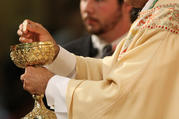Click here if you don’t see subscription options









Public Scandal
Having read your recounting of Cardinal Joseph Ratzinger’s advice to the U.S. bishops on morality in voting (Signs of the Times, 7/19), I find it little wonder that there is a great deal of confusion. But it should be quite apparent to any right thinking person that the murder of 40 million innocents is not comparable to an individual’s marriage-vow problems. The point to be dealt with here clearly is public scandal. Any politician who purports to be Catholic and supports the intrinsically evil practice of abortion is giving public scandal, notwithstanding all the specious excuses that have been concocted.
Such a person should not be treated as a Catholic communicant for his own good and, more important, in order to avoid confusing people generally as to Catholic teaching and especially scandalizing the faithful. Christ’s teaching on giving scandal is frighteningly explicit.
The politician’s sin is openly public and should be dealt with by his pastor or bishop in a public manner, not with the hierarchy hiding in their offices for fear of unpopularity or loss of their tax immunity.
Not only does a public condemnation of the individual politician’s position emphasize his moral error in the arena most important to him; it would also serve to inform and emphasize to the public at large the importance of the issue in church teaching. Those who wish to follow Christ must be his witnesses and face martydom as he did in leading the faithful to the truth rather than worrying about public attack or approbation. It is significant and sad that the bishops who have done their duty by speaking out against the public scandal of pro-abortion Catholic politicians can be readily named because of their small number, which goes a long way to explaining the reasons for the difficulties, confusion and other scandals experienced by the American Catholic Church in the post-Vatican II era.
Thomas P. Dowd
“Prepare a full account of your stewardship” (Lk 16:2)

